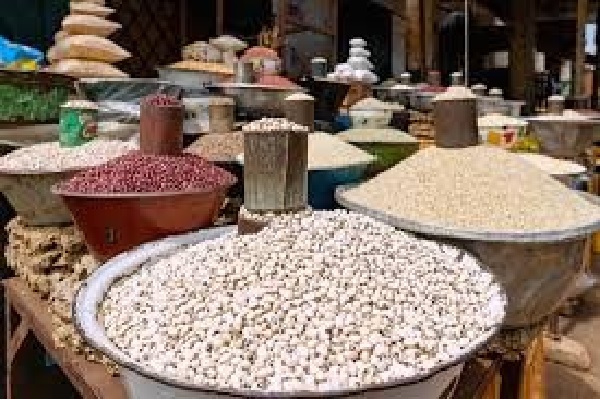The dry spell the northern part of Ghana experienced in recent months has had a catastrophic impact on agricultural production, triggering a surge in staple food prices.
This has placed immense economic hardship on traders and consumers in the Tamale metropolitan area.
A market survey conducted by Graphic Business at the Tamale Aboabo Market revealed staggering price increases of nearly 100 per cent over just two months for essential crops such as maize, yam and tomatoes.
A bowl of groundnut which used to sell at GH¢21 cedis is now selling at GH¢32 cedis, an increase of GH¢11 cedis, and a bag of groundnut that was GH¢900 cedis is now GH¢1,300, a difference of GH¢400 cedis. Within a period of two months, the price of a bag of local rice has risen from GH¢250 to GH¢600, an increase of GH¢350.
Millet, two months ago, was selling at GH¢950 a bag but has increased to GH¢1,250, a significant increase of GH¢350. A bowl of beans that used to be sold at GH¢55 cedis is now selling at GH¢75. Corn, which is the most common staple used by people is now sold at GH¢25 for a bowl, a GH¢5 increase from the previous amount of GH¢20, with a bag now selling at GH¢850.
These soaring prices are pushing basic food items beyond the reach of many Tamale residents, threatening food security and imposing a severe economic strain on households.
Low-income families are being priced out of access to adequate nutrition, with the crisis disproportionately impacting the most vulnerable members of the community.
The Graphic Business believes the situation paints a troubling picture of the real-world consequences of extreme weather events driven by climate change.
The prolonged drought has decimated crop yields, constricting food supply and driving up prices. Traders are struggling to maintain their livelihoods as customer demand plummets, while consumers are forced to make impossible choices between feeding their families and paying for other essentials.
The Tamale community is now staring down the barrel of a full-blown humanitarian emergency, with malnutrition, stunted child development and a range of negative health outcomes looming as very real threats.
Urgent action is needed to stabilise food supplies, provide direct relief to affected populations and build long-term resilience against the impact of climate change.
The Ghanaian government must mobilise comprehensive interventions to support struggling farmers, strengthen food distribution networks and expand social safety net programmes to ensure all residents can afford adequate nutrition.
Investments in climate-smart agricultural practices, irrigation infrastructure and early warning systems are also critical to mitigate the risks of future extreme weather events.
Beyond the borders of Ghana, this crisis underscores the pressing need for the international community to act with greater urgency on climate change.
As global temperatures continue to rise, weather patterns grow more erratic and ecosystems become increasingly destabilised, vulnerable communities around the world will face escalating threats to food security.
Tamale's plight is a sobering preview of the challenges that many other cities may soon be confronted with.
The world cannot afford to remain idle in the face of this looming catastrophe. Governments, businesses and civil society must come together to drive transformative action on emission reductions, climate adaptation, and build a more sustainable, equitable global food system.
